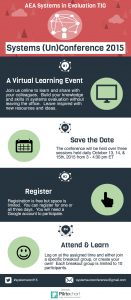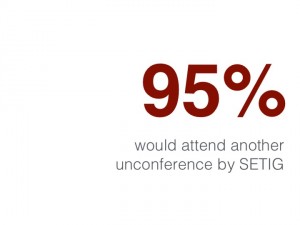Hi, I’m Bethany Laursen, interdisciplinarity consultant and chair of the 2016 Systems in Evaluation TIG (Un)Conference coordinating committee. When SETIG was searching for a community learning activity, we chose the unconference format to demonstrate the systems principles our TIG emphasizes. An unconference applies Open Space Technology to group meetings. Instead of a predetermined program with speakers and presenters, the participants themselves decide the topics to be discussed in breakout rooms when they arrive, and everyone is an equal contributor.
(click for larger image)
 Participants loved our inaugural unconference. The follow-up evaluation showed that 95% of participants would attend another SETIG (Un)Conference, and 79% would recommend a similar style event to others. You can run an unconference too!
Participants loved our inaugural unconference. The follow-up evaluation showed that 95% of participants would attend another SETIG (Un)Conference, and 79% would recommend a similar style event to others. You can run an unconference too!
Rad Resource: MIT’s UnHangout Platform is designed especially for virtual unconferences. It’s free, user-friendly, and their support team is great.
Lesson Learned: Since none of us had any prior experience running a purely “open” unconference format (one in which participants build the entire structure once they show up), we chose to add a moderate amount of structure to our format and hopefully entice more people to participate. We predetermined 12 discussion topics and recruited a facilitator for each topic. However, we also gave participants the option to create new topics when they arrived online. U nlike traditional conferences, facilitators did not present on the topic but rather facilitated discussion and sharing. Participants were free to come and go from the breakout rooms as they pleased.
nlike traditional conferences, facilitators did not present on the topic but rather facilitated discussion and sharing. Participants were free to come and go from the breakout rooms as they pleased.
Rad Resource: We structured our unconference around the Principles of Open Space Technology:
- Whoever comes are the right people.
- Whatever happens is the only thing that could have.
- When it starts is the right time.
- When it’s over it’s over.
- The Law of Two Feet: If you find yourself in a situation where you are neither learning nor contributing, move somewhere where you can.
Lesson Learned: Many people did not test their connections before the first day, so some experienced technical problems that might have easily been avoided. This year, we plan to hold a dress rehearsal to facilitate technical troubleshooting before the event.
Hot Tip: If your TIG is considering an unconference, be sure to coordinate your planned date with AEA’s calendar of events.
Rad Resources: See this post for a more detailed write up of our inaugural unconference, including a link to our evaluation results.
The American Evaluation Association is celebrating this week with our colleagues in the Systems in Evaluation Topical Interest Group. The contributions all this week to aea365 come from our Systems in Evaluation TIG members. Do you have questions, concerns, kudos, or content to extend this aea365 contribution? Please add them in the comments section for this post on the aea365 webpage so that we may enrich our community of practice. Would you like to submit an aea365 Tip? Please send a note of interest to aea365@eval.org. aea365 is sponsored by the American Evaluation Association and provides a Tip-a-Day by and for evaluators.
